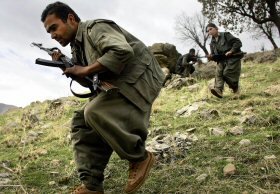
With Gaza under the sway of Hamas, Lebanon paralyzed, and Iraq near collapse, the Middle East has never looked more perilous. But if the United States doesn’t move to defuse the dangerous situation in Iraqi Kurdistan fast, Washington could find itself with yet another ticking time bomb.
As if disaster in Baghdad were not enough, Washington has largely stood by as Iraq’s Kurds have become embroiled in a fierce dispute with Turkey that threatens to explode into violence, destabilize northern Iraq, and further embitter relations between the United States and Turkey, a vital strategic ally for 60 years. With parliamentary elections out of the way, Turkey may well invade northern Iraq, a move that-"to put it mildly-"would complicate an already complicated situation in the Middle East.

There is still time for the United States to prevent such a catastrophe, but this season’s bloody offensive by the Kurdistan Workers’ Party, or PKK, a separatist guerrilla group labeled a terrorist organization by the United States, has brought tensions to a near-boiling point. Turks are enraged that PKK forces can launch bombing attacks in Turkey and then find safety and sympathy in the mountains of Iraqi Kurdistan. The Turkish military increasingly warns that it needs to attack these safe havens, and it has massed tens of thousands of troops at the border.
Turkish concerns over northern Iraq, of course, run deeper than the PKK. The mostly autonomous Kurdish entity next door is the threat to Turkey’s territorial integrity that its leaders long feared-"potentially deepening Kurdish nationalism among its 12 to 15 million-strong Kurdish minority. And then there’s Kirkuk, which looms as a litmus test of Kurdish intentions. The Kurdish Regional Government is encouraging Kurds to migrate to this historically mixed city, seeking to hold a referendum by year’s end to make the area part of Iraqi Kurdistan. But Kurdish absorption of oil-rich Kirkuk would only vindicate Turkish (and Arab) suspicions that the Kurds are plotting for independence-"long a red line for all Turkish governments.
Turkish generals are cautious by nature. Despite their repeated threats and even the occasional shelling, they will not go into northern Iraq lightly. They remember the 1990s, when they invaded the region four times and suffered sizeable casualties without resolving the PKK problem. So far, Ankara’s threats have been designed to prod the Kurds and the Americans to act against the PKK in Iraq. But the Turks are losing their patience, and the heightened anti-Kurdish nationalism of the political campaign raises significantly the odds that the government will be compelled to take action after the next serious PKK incident on Turkish soil.
Life was different a decade ago for Iraq’s Kurds, when the forces of Kurdish leader Massoud Barzani joined the Turks in fighting the PKK. The Iraqi Kurds badly needed Turkey and the U.S. aircrafts that were flying from Turkish bases to deter Saddam from invading their established secure area in northern Iraq. With hard work and much luck, that secure area emerged as Iraqi Kurdistan. Today, an emboldened Barzani, newly minted as president of Iraqi Kurdistan, looks the other way as the PKK makes free use of his territory. So does Iraq’s president, Jalal Talabani, the other major Kurdish leader. Barzani has even threatened Turkey with all-out war if the Turks invade.
As for the administration of U.S. President George W. Bush, it has given the Kurds almost carte blanche in northern Iraq. It badly needs stability there, and Kurdish peshmerga troops have helped battle insurgents elsewhere in Iraq. Knowing their value as allies, the Kurds have shrugged off the entreaties of retired NATO commander and special envoy Joseph W. Ralston, whom President Bush charged with solving the PKK problem. Ralston’s talks with his Turkish counterpart and Barzani’s people have bought time, but the U.S. military is divided about taking real action. Most generals do not want to antagonize the Kurds or expend military resources on the PKK. The CIA is overstretched. So the Americans fall back on rhetoric, phone calls, and warnings, while Turkish emotions burn hotter. U.S. inaction has turned the Turkish public against the United States-"just 9 percent of Turks have favorable views of the United States, according to the latest Pew Global Attitudes survey.
The time for ineffectual consultations and dithering is over. Speaking with one voice, the U.S. government must convince Barzani that even though his people sympathize with the PKK’s cause, cracking down on the PKK is in Iraqi Kurdish interests. Iraqi Kurdistan may be booming now, but its economic and political success is at risk if Turkey takes military action. Moreover, no matter what the United States says now, it will eventually leave Iraq, and the Kurds will be alone with hostile neighbors who oppose an independent Kurdish state. Given this impending reality, it is unwise for the Iraqi Kurds to alienate their only Western-oriented, democratic neighbor any further.
Cracking down on the PKK won’t be painless, but it is doable. In their mountain redoubts, PKK forces cannot be eliminated, but the Iraqi Kurds can reduce their operations, arrest some top people, and destroy their facilities. The United States can help with intelligence and logistic support. The Iraqi Kurds must work with Turkish forces to prevent infiltration into Turkey. If the Iraqi Kurds are not prepared to act-"and act soon-"the United States should use its air power to help destroy the PKK and its limited infrastructure in Iraq. This problem can no longer be sidelined.
Moving against the PKK in northern Iraq does not let Turkey off the hook, however. Its own Kurdish problem could become the biggest political issue for Turkey’s new government. At some point, Turkey must decide how to deal with Iraqi Kurdistan other than to ignore its political existence. More importantly, the Turks will finally have to deal with their own Kurdish dilemma. That is for another day, but soon.


